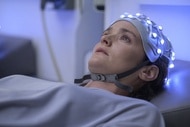Create a free profile to get unlimited access to exclusive videos, sweepstakes, and more!
NASA will give you $18.5K just for lying in bed for 60 days

Are you the type who is always late for work because you can’t unstick yourself from your bed in the morning? Do you wish you could recline airplane seats all the way? Does your ideal weekend consist of sleeping in and more sleeping in?
NASA, the ESA and the German Aerospace Center (DLR) are willing to give you $18.5K for 60 days lying in bed. Really. The thing is, you literally cannot get up for 60 days. This is their first joint bed-rest study (AGBRESA) meant to examine the effects of microgravity on the human body. The first phase of which is already underway, and they’re seeking volunteers — especially women between the ages of 18-55 — for the second phase right now.
"Crewed spaceflight will continue to be important in the future in order to carry out experiments in microgravity, but we must make it as safe as possible for the astronauts," said DLR Executive Board Member for Space Research and Technology Hansjörg Dittus.
So here’s what you’re going to have to do. If you are one of the 12 male and 12 female volunteers selected for the study (knowing decent German is a plus), you will have the ultimate excuse to spend 60 days lying down in the DLR Institute of Aerospace Medicine’s medical research facility, :envihab. A mashup of “environment” and “habitat”, :envihab was designed for testing the physiological effects of future space missions.
Subjects will go through a 15-day pre-test phase and a 15-day recovery phase, which means an 89-day stay at :envihab. You will do everything lying down. Everything. From experiments to meals to Netflix marathons, you will be on a bed angled six degrees downward to mimic the displacement of bodily fluids astronauts experience, and your movements will be restricted to reduce strain on tendons, muscles and bones to simulate a zero-G environment.
"Both effects are similar to what astronauts experience in space,” said Leticia Vega, Associate Chief Scientist for International Collaborations for NASA’s Human Research Program. "Although the effects of weightlessness are primarily investigated on the International Space Station, analogues such as :envihab are helpful when studying certain research topics under controlled conditions on Earth. These findings will later be validated on the ISS."
We are just not designed to live without Earth’s gravity. Our bodies are programed to drastically reduce functions that are not being used enough, which is why astronauts risk muscular and skeletal atrophy when on board the ISS. No gravity also means reduced cardiovascular strain, along with bodily fluids migrating upwards. Both can be detrimental to performance.
The simulated weightlessness used on Phase 2 subjects, combined with the artificial gravity Phase 1 subjects experience in a human centrifuge, will help researchers figure out how to prevent degeneration in space.
After taking all this in, would you still do this for the payout? Someone out there is going to.
(via DLR)


























